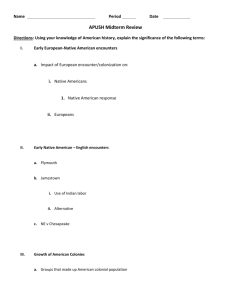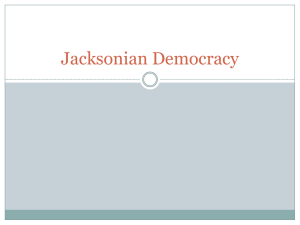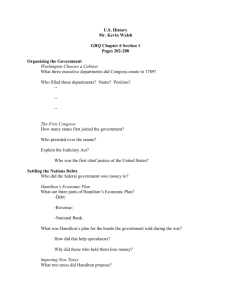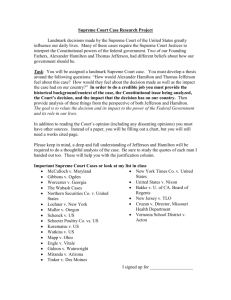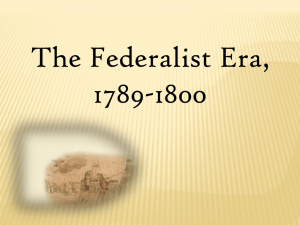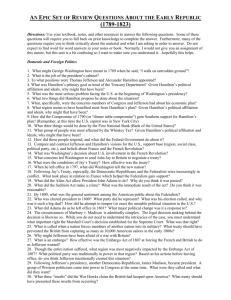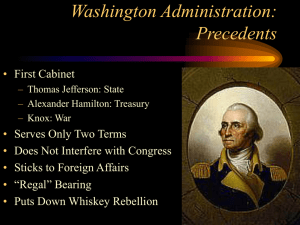Unit 3: The Political Development of a New Nation
advertisement
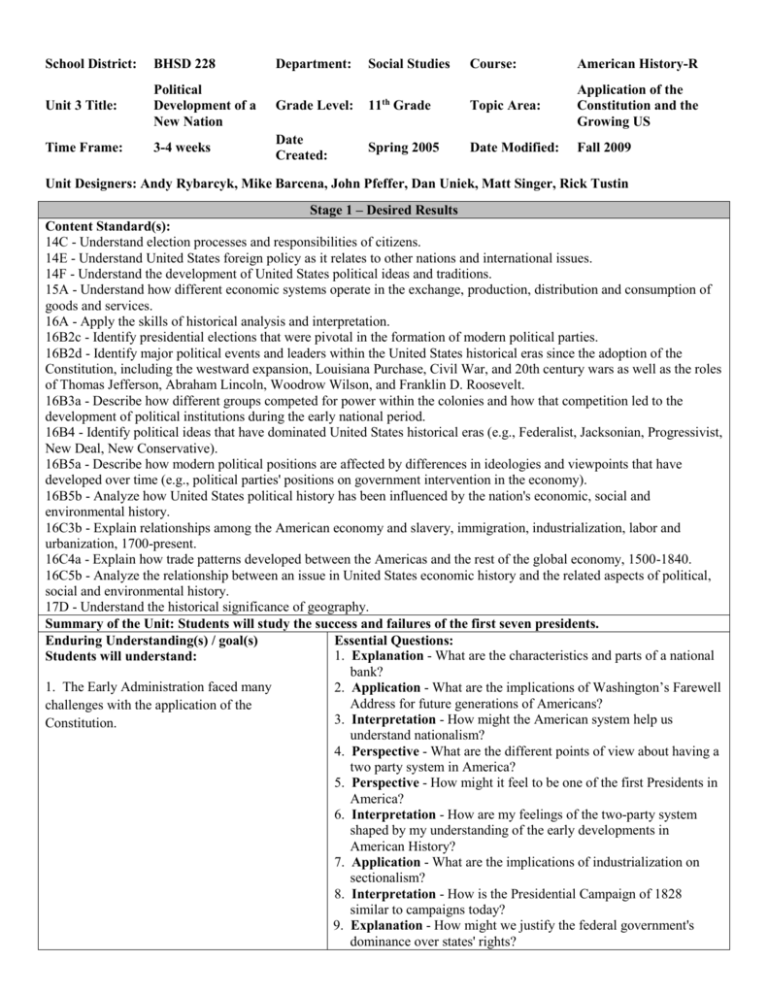
School District: BHSD 228 Department: Social Studies Course: American History-R Unit 3 Title: Political Development of a New Nation Grade Level: 11th Grade Topic Area: Application of the Constitution and the Growing US Time Frame: 3-4 weeks Date Created: Spring 2005 Date Modified: Fall 2009 Unit Designers: Andy Rybarcyk, Mike Barcena, John Pfeffer, Dan Uniek, Matt Singer, Rick Tustin Stage 1 – Desired Results Content Standard(s): 14C - Understand election processes and responsibilities of citizens. 14E - Understand United States foreign policy as it relates to other nations and international issues. 14F - Understand the development of United States political ideas and traditions. 15A - Understand how different economic systems operate in the exchange, production, distribution and consumption of goods and services. 16A - Apply the skills of historical analysis and interpretation. 16B2c - Identify presidential elections that were pivotal in the formation of modern political parties. 16B2d - Identify major political events and leaders within the United States historical eras since the adoption of the Constitution, including the westward expansion, Louisiana Purchase, Civil War, and 20th century wars as well as the roles of Thomas Jefferson, Abraham Lincoln, Woodrow Wilson, and Franklin D. Roosevelt. 16B3a - Describe how different groups competed for power within the colonies and how that competition led to the development of political institutions during the early national period. 16B4 - Identify political ideas that have dominated United States historical eras (e.g., Federalist, Jacksonian, Progressivist, New Deal, New Conservative). 16B5a - Describe how modern political positions are affected by differences in ideologies and viewpoints that have developed over time (e.g., political parties' positions on government intervention in the economy). 16B5b - Analyze how United States political history has been influenced by the nation's economic, social and environmental history. 16C3b - Explain relationships among the American economy and slavery, immigration, industrialization, labor and urbanization, 1700-present. 16C4a - Explain how trade patterns developed between the Americas and the rest of the global economy, 1500-1840. 16C5b - Analyze the relationship between an issue in United States economic history and the related aspects of political, social and environmental history. 17D - Understand the historical significance of geography. Summary of the Unit: Students will study the success and failures of the first seven presidents. Enduring Understanding(s) / goal(s) Essential Questions: 1. Explanation - What are the characteristics and parts of a national Students will understand: bank? 1. The Early Administration faced many 2. Application - What are the implications of Washington’s Farewell Address for future generations of Americans? challenges with the application of the 3. Interpretation - How might the American system help us Constitution. understand nationalism? 4. Perspective - What are the different points of view about having a two party system in America? 5. Perspective - How might it feel to be one of the first Presidents in America? 6. Interpretation - How are my feelings of the two-party system shaped by my understanding of the early developments in American History? 7. Application - What are the implications of industrialization on sectionalism? 8. Interpretation - How is the Presidential Campaign of 1828 similar to campaigns today? 9. Explanation - How might we justify the federal government's dominance over states' rights? Key Words: nullification, War Hawk, nationalism, sectionalism, secede Student objectives (outcomes): Students will be able to: Compare and contrast the beliefs of Federalists and Democratic Republicans. Identify the impact of presidential policy on early America Identify the causes and impacts of the War of 1812 Explain the "Corrupt Bargain". Explain Jackson's opposition to the bank. Explain Jackson's plan for Indian removal. Whether Jackson’s presidency was motivated by personal vendetta or interest in the common man. The election of 1824, 1828 consisted of mudslinging and underhanded politics Students will know: Washington’s Cabinet, American System, Monroe Doctrine, George Washington, John Adams, Thomas Jefferson, James Madison, James Monroe, Alexander Hamilton, Hamilton's financial plan for America, War of 1812, National Bank, Alien and Sedition Acts, XYZ Affair, Louisiana Purchase, Election of 1800, Whiskey Rebellion, Aaron Burr’s duel with Hamilton Students will be familiar with: Burning of Washington, Washington’s Farewell Address, Marshall Court, Second Great Awakening Performance Task (GRASP): Hamilton & Jefferson Debate Stage 2 – Assessment Evidence Other Evidence: Andrew Jackson Wanted Poster Stage 3 – Learning Plan Learning Activities: What sequence of teaching and learning experiences will equip students to develop and demonstrate the desired understandings? W = How will you ensure that all students know where they are headed in the unit, why they are headed there, and how they will be evaluated? Lesson plan objectives provided. Rubrics will be used as an assessment tool. UbD Stage 1 “Identifying Desired Results” provided for students. UbD Stage 1 “Identifying Desired Results” will be assessed as short answer, essay, unit test, etc H = How will you hook students at the beginning of the unit? (Unit Specific) Pose the question to students “Do you think your vote as an American citizen really matters? E = What events will help students experience and explore the big idea and questions in the unit? How will you equip them with the needed skills and knowledge? (Unit Specific) Students will compare and contrast the ideologies of Hamilton and Jefferson (See GRASP). R = How will you cause students to reflect and rethink? How will you guide them in rehearsing, revising, and refining their work? Students will participate in journal entries. Students will be exposed to quizzes and self correct assessments with provided rubrics E = How will you help students to exhibit and self-evaluate their growing skills, knowledge, and understanding throughout the unit? (Unit Specific) Create a political cartoon comparing/contrasting Andrew Jackson vs. John Quincy Adams? T = How will you tailor and otherwise personalize the learning plan to optimize the engagement and effectiveness of ALL students, without compromising the goals of the unit? Multiple intelligence research will be utilized in creating assessments. EPAS reading scores will assist teachers in tailoring instruction and assessment. Students will be given a variety of assessment choices. O = How will you organize and sequence the learning activities to optimize the engagement and achievement of ALL students? (Unit Specific) Each unit will be formatted in accordance with the UbD Model and approached chronologically. Teachers will pace instruction in accordance with the EUs and EQs.
